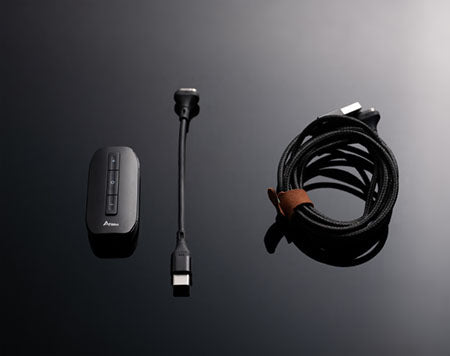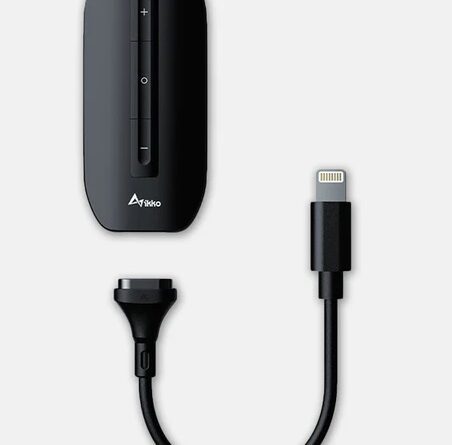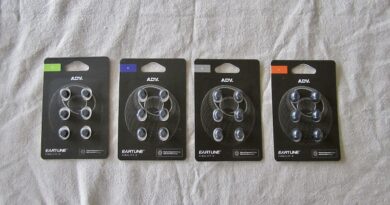Ikko ITM01 Zerda Review (2) – Second Opinion
The company sent me their IKKO ITM01 Zerda dac-amp dongle as a sample unit for review a while ago, and here are my thoughts on this lightweight, very small-budget ($52) device, which you can get from Ikko’s direct shop, or multiple distributors in the world.
In this Article
At-a-glance Card
| PROs | CONs |
| Good output powering capabilities | Modest DAC/AMP performances (in line with price) |
| Interesting magnetic modular connector system | Proprietary plug module replacements may be difficult to get |
| Three predefined tuning presets for music listening, game playing and movie watching | Some attention recommended while switching presets |
| Driver-less, seemless multiple hosts support | |
| Support for in-line microphones | |
| Inexpensive |

Features and description
Externals
IKKO ITM01 is more or less the size of 2 AA batteries, a bit thinner than those, and much lighter in weight. It’s actually small and lightweight enough not to represent a significant burden to a smartphone once connected to its USB-C port.
The chassis is plastic, and its black satin finish is quite prone to scrathes, besides feeling not particularly resistant vs possible traumatic compressions or such. Still, perfectly adequate to normal daily use including quick pocketing/unpocketing during communing etc.
Internals
IKKO declares that ITM01 is developed around an ESS custom chip codenamed ESS9298 featuring low noise and high current output. I couldn’t find better specifications by searching on Esstech websites or around, sadly.
Face value specs are interesting, as the chip can accept out to 32bit / 384KHz PCM and up to DSD 128. No MQA support is offered though.
Output power is declared at 2V (125mW) @ 32 Ohm load, but with the big (positive) caveat represented by an adaptive gain to properly support more demanding loads – more on this later.
Input
Only digital input over USB is allowed into ITM01, with the specialty represented by a priorietary magnetic cable connector.
Unlike most competitors, the USB connector on IKKO ITM01 main body follows a special design encompassing a magnetized connector offering very quick disconnection capabilities while keeping extremely firm and solid connectivity while the plug is in place.
Among the advantages of the proprietary magnetic connectors is system resilience in case someone inadvertedly pulls the earphone cable: the magnetic plug will be “weak enough” in such case as to get disconnected rapidly, avoiding mechanical stress on other parts of the line.
IKKO ITM01 ships equipped with 2 replaceable short cables, one ending in a USB-A plug, the other in a USB-C plug. An Apple Lightning plug option is also available and can be separately purchased.
Output
The sole output port available on ITM01 is a 3.5mm single ended audio connector – with a quite uncommon specialty though: it fully supports microphones built into the connected drivers.
Which means that with ITM01 one can seamlessly switch from music listening to handling calls exactly like I would with a mic-equipped earphone directly connected to the phone. Or, that one can keep their mic-equipped headphone connected to IT01 and go from watching a movie to playing a game including audio chat.
Volume and gain control
ITM01 has hardware volume buttons on its main body, which are correctly liaised with system volume controls both on Windows and Android hosts: actionating upon the hw buttons host volume control moves up and down smoothly and without the need for any driver to be installed.
ITM01 also comes with a load sensing system, which switches to high gain mode when higher impedance drivers are connected. The threshold is not documented, based on my empirical essays I would say it’s around 32 ohm.
Other features
Tuning presets
ITM01 comes equipped with 3 “preset tunings”. Each “tuning” modifies the sound presentation, offering a different impact to the user.
The user can quickly select and cycle-through them by long-pressing the central button on the main device body. When each tuning is selected, a led on the chassis side will light of a different colour:
- Music (Yellow led)
- Movie (Blue led)
- Game (Purple led)
More on them below.
Ikko ITM01 Zerda Sound
Let me start by considering the “Music” (Yellow led) tuning preset.
One good thing that’s immediately noticed when using ITM01 is the significant power this unassuming thingie is able to feed into so many different drivers I could pair to it.
ITM01 delivers a lot of current into low impedance, low sensitivity loads (E3000, E5000 & such). And, it also drives HD600 or SRH1540 with authority in terms of powering, most certainly thanks to the selfswitching gain following the internal impedance adapting tech.
With that said, sound quality is in line with the device cost (50 bucks) so don’t expect big wonders: DAC reconstruction, while surely better than my phone or my PC’s built-in systems, is not particularly extended nor resolving, generally quite neutral with some bass accent.
The amping module lacks in dynamic range and most of all transparency. In addition to the general low budget situation, ITM01’s adaptive-gain capabilties present their bill here.
The situation with amping gets a bit better when ITM01 is connected via an appropriate USB conditioner (eg my Nano iUSB2), or to a less-noisy host, e.g. a battery based transport. But even with that, “pure” sound quality is not the reason why one would want an ITM01 in its pockets.
Switching to Movie mode (Blue led) the most evident change is in mid frequencies which are pushed significantly forward, both in terms of power and imaging. The soundstage gets narrower horizontally, but deeper, definitely more intimate. Imaging gets also trickier due to a sort of “central panning” switch.
Game mode (Purple led) can be seen as the opposite of Movie mode in a sense: instead of shrinking and concentrating the scene towards the center, and the mid frequencies, Game mode sorts of “furtherly distributes” the instruments along the horizontal axis, presenting a wider but almost totally flat soundstage. This is good while gaming to facilitate on steps / noises / events positioning although definitely not organic when it comes to music.
An important caveat: mode switching is not totally seamless nor totally instanteneous. In particular, volume jumps may happen between one and the next mode so it’s recommended to pause playback before switching.
Considerations & conclusions
At the end of the day everyting is relative in life.
On one hand I could say that IKKO ITM01 does not shine in tems of audiophile finesse. On the other hand, though, all better devices I heard cost at least twice as much.
IKKO ITM01 offers some very nice, and even unique features which make it worth considering as a very inexpensive, general-purpose, entry-level dac-amp dongle for music listening, gaming and even office communication support.
Our generic standard disclaimer.







